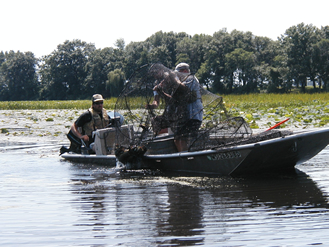- Home
- About S&T
- Taxa/Organisms
- Ecosystems
- Issues
- Methods & Tools
- Reports & Publications
- Location
- Search
Publisher: NBII | Format: URL
pollinators.nbii.gov — The global declines in many kinds of pollinator species could potentially impact the global food supply, as many plants depend upon specific pollinators to reproduce. The Web site of the NBII Pollinators Project provides access to information about the biology, ecology, conservation status, and threats to native pollinators, pollinator-dependent More...

Publisher: USGS | Science Center: Upper Midwest Environmental Sciences Center (UMESC, LaCrosse) | Format: URL
www.umesc.usgs.gov — This web resource provides decision makers with the information needed to maintain the Upper Mississippi River System as a viable multiple-use large river ecosystem. This resource also includes Data and sampling information, publication links, reports, other related documents and statistics, as well as links to field stations and other projects More...

Publisher: USGS | Science Center: Western Ecological Research Center (WERC, Sacramento) | Format: URL
www.werc.usgs.gov — Invasion and subsequent restructuring of ecosystems by nonnative organisms is taking on increasingly urgent significance as an example of human-caused environmental change with potentially dramatic consequences. This web resource discusses the affects of vascular plants - particularly in Sequoia, Kings Canyon, and Yosemite National Parks - on the More...

Publisher: USGS | Science Center: Western Ecological Research Center (WERC, Sacramento) | Format: URL
www.werc.usgs.gov — The Fire and Fire Surrogate study is a network of 13 long-term sites established nationwide to evaluate the ecosystem impacts of different fire hazard reduction treatment in forests that historically experienced short-interval, low- to moderate-severity fire regimes. The fuel reduction treatments being investigated by USGS researchers at Sequoia More...

Publisher: NBII | Format: URL
www.nbii.gov — Natural resource managers face complex decisions that require a clear understanding of the status of wildlife populations and their habitats. Monitoring is key to making effective management decisions and evaluating the outcomes of those decisions. The goal of NRMP is to improve the accessibility of monitoring efforts to resource managers to aid More...

Publisher: USGS | Science Center: Fort Collins Science Center (FORT, Ft. Collins) | Format: URL
www.fort.usgs.gov — Natural Resource Monitoring Partnership (NRMP) is a collaborative effort by the natural resource management community to improve monitoring efforts in order to support effective evaluation and decision-making by sharing information on monitoring projects and protocols. The Natural Resource Monitoring Partnership was built for easy access to More...

Publisher: USGS | Science Center: Western Ecological Research Center (WERC, Sacramento) | Format: URL
www.werc.usgs.gov — This web resource addresses the positive relationship between cheatgrass (Bromus tectorum) and fire frequency as a major concern for land managers in semi-arid shrublands throughout western North America, particularly in Great Basin sagebrush steppe. Management tools are needed to break this cycle, and in this project we will evaluate the use of More...
